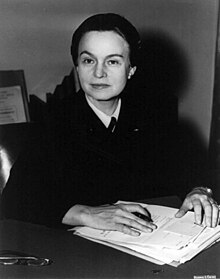Oveta Hobby
| Oveta Culp Hobby | |
|---|---|
 |
|
| 1st United States Secretary of Health, Education, and Welfare | |
|
In office April 11, 1953 – July 13, 1955 |
|
| President | Dwight Eisenhower |
| Preceded by | Herself (Federal Security Agency Administrator) |
| Succeeded by | Marion Folsom |
| Administrator of the Federal Security Agency | |
|
In office January 20, 1953 – April 11, 1953 |
|
| President | Dwight D. Eisenhower |
| Preceded by | Oscar Ewing |
| Succeeded by | Herself (Health, Education and Welfare Secretary) |
| Personal details | |
| Born |
Oveta Culp January 19, 1905 Killeen, Texas, U.S. |
| Died | August 16, 1995 (aged 90) Houston, Texas, U.S. |
| Political party |
Democratic (Before 1953) Republican (1953–1995) |
| Spouse(s) | William Hobby |
| Education |
University of Mary Hardin South Texas College of Law University of Texas, Austin |
| Military service | |
| Allegiance |
|
| Service/branch |
|
| Years of service | 1941–1945 |
| Rank |
|
| Commands | Women's Army Auxiliary Corps (later the Women's Army Corps) |
| Battles/wars | World War II |
| Awards |
|
Oveta Culp Hobby (January 19, 1905 – August 16, 1995) was the first secretary of the U.S. Department of Health, Education and Welfare, first director of the Women's Army Corps, and a chairperson of the board of the Houston Post.
Culp was born on January 19, 1905, in Killeen, Texas to Isaac William Culp and Emma Elizabeth Hoover. An autodidact, she briefly attended Mary Hardin Baylor College for Women, and attended law classes at South Texas College of Law and Commerce. She did not graduate from either school. She went on to study law at the University of Texas Law School, but she did not formally enroll and therefore never received a degree. Starting at age 21, for several years she served as parliamentarian of the Texas House of Representatives.
During World War II she headed the War Department's Women's Interest Section for a short time and then became the Director of the Women's Army Auxiliary Corps (later the Women's Army Corps), which was created to fill gaps left by a shortage of men. The members of the WAC were the first women other than nurses to wear U.S. Army uniforms. Hobby achieved the rank of colonel and received the Distinguished Service Medal for efforts during the war. She was the first woman in the Army to receive this award.
President Dwight D. Eisenhower named her head of the Federal Security Agency, a non-cabinet post, and she was invited to sit in on cabinet meetings. Soon, on April 11, 1953, she became the first secretary, and first female secretary, of the new Department of Health, Education, and Welfare, which later became the Department of Health and Human Services. This was her second time organizing a new government agency. Among other decisions and actions at HEW, she made the decision to approve Jonas Salk's polio vaccine.
...
Wikipedia
